Here’s what nobody tells you: while everyone obsesses over anti-American sentiment, and the internet is trying to convince Americans that they are unwelcome everywhere. Not true – I know at least 8 friendly countries for US citizens.
TCountries where Americans are not just accepted – they are appreciated.
I experienced this personally – I was born in a pro-American nation, then moved to one that’s even more welcoming to US citizens.
I am talking about places where you’ll find statues honouring American presidents, locals who will thank you personally for what the USA has done for their country, and where being American opens doors that money can’t buy.
In one of these countries, it’s not uncommon to see an American flag proudly displayed in people’s living rooms.
Each country’s love affair with the US comes from completely different reasons – some based on security, others on economics, and some on shared history that changed the course of their nation forever, and if you’re planning to move abroad, work remotely, or retire overseas, knowing these 8 countries could change everything. Exploring these relationships can reveal much about the cultural landscape and opportunities available in each nation. For those seeking the best countries for a fresh start, understanding these dynamics can help tailor your experience to fit your goals and lifestyle. Whether you’re drawn to vibrant cities or serene landscapes, these nations offer unique environments that can enrich your new chapter abroad.
And we start with a country that will likely surprise you.
Iran
Nah, I am just joking – sorry.
Lithuania
Lithuania holds a secret that most Americans don’t know about. This tiny Baltic nation of just 2.8 million people has a bond to America because of one decision in the last century.
Back in 1940, when the Soviet Union swallowed Lithuania, every major world power looked the other way. Britain moved their embassy, France updated their maps, and the world recognized Soviet control as the new normal.
Every power except one: the United States refused to recognize the Soviet annexation for 50 long years. While other countries moved on, America kept Lithuania’s embassy in Washington open for the entire Cold War. This was made official by a policy called the Welles Declaration, and America stuck to it.
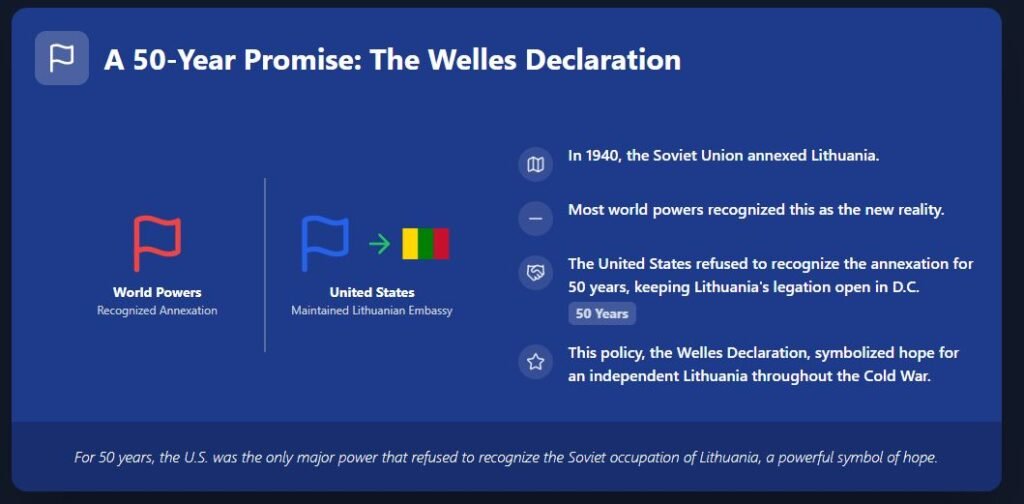
For Lithuanians living under Soviet occupation, this stance offered hope, as America represented the one country that still believed their nation had the right to exist.
Today, that bond is stronger because of NATO. This alliance is vital for Lithuania, as it shares a border with Russia. Because of this, Lithuania spends more on its military per person than almost any other NATO country. A large part of that money is used to buy US military equipment. Between 2018 and 2022, America provided over 200 million dollars in security funding to modernize Lithuanian forces. In 2022 alone, the US sent an additional 141 million dollars in Foreign Military Financing.
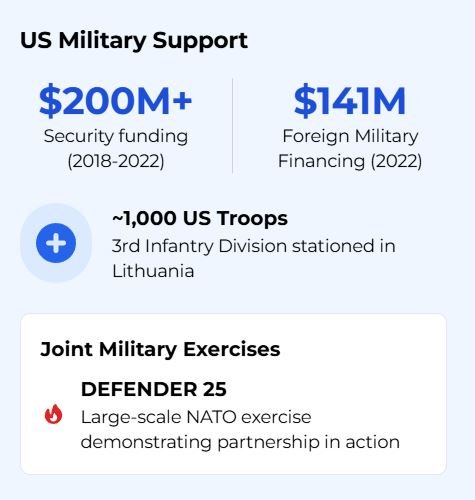
Lithuania also hosts close to 1000 American soldiers from the 3rd Infantry Division, with regular joint exercises like DEFENDER 25 that show this partnership in action.
A 2019 poll found that 70 percent of Lithuanians hold favorable views of the United States. US government reports describe Lithuania as having “very little anti-American sentiment” compared to other European nations.
There is also another passion that united both countries: basketball. Lithuanian players compete in American leagues, and former NBA stars also played in Lithuanian courts. In fact, it is one of the five European countries where football is NOT the dominant sport.
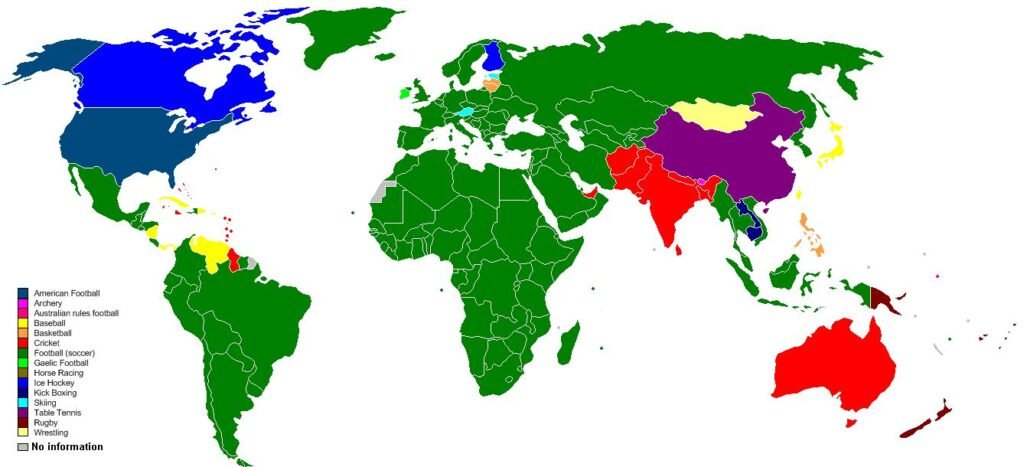
For American expats, Lithuania offers something unique in Europe. English is widely spoken, many Lithuanians have relatives or business connections in America, and US culture remains popular among younger generations.
Now, one thing I just realized is that despite living very close to Lithuania, I never talked about them here (or Estonia, or Latvia) – so if you want me to write an article about our neighbors, let me know in the comment section!
Argentina: The Radical Economic Realignment
Two years ago, Argentina did something that surprised the entire world – and it has everything to do with how Americans are now treated there. This South American giant completely flipped its relationship with the United States in a matter of months.
For decades, Argentina had a rocky relationship with Washington, known for anti-American protests and governments that positioned themselves as critics of US foreign policy. They even were in the process of joining the BRICs.
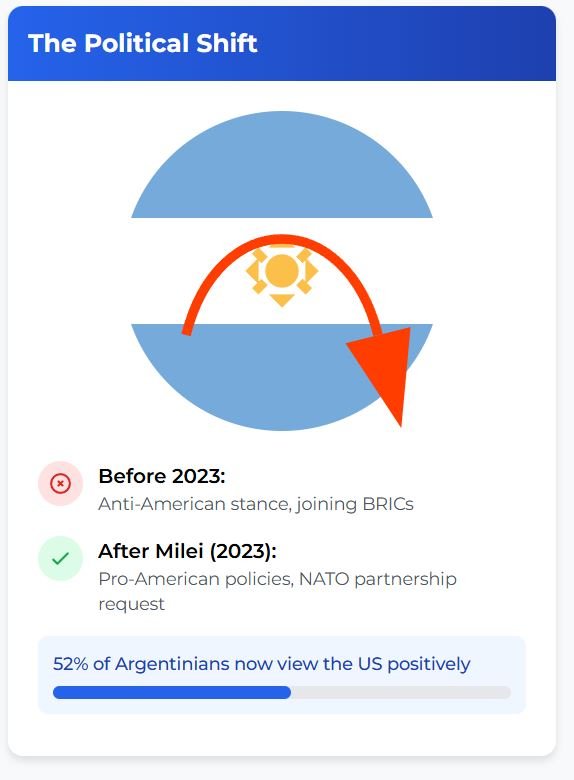
Then came 2023, and everything changed overnight with one man: President Javier Milei. When Milei took office in late 2023, he didn’t just shift toward America. He went full throttle in his alignment with US policies. His administration immediately began requesting NATO Global Partner status in early 2024, signaling a complete reversal of Argentina’s previous foreign policy approach.
Milei’s government also moved to buy US-made F-16 fighter jets. This was a major defense deal that links Argentina’s military to American technology and training. It is one of the biggest military partnerships between the two countries in decades.
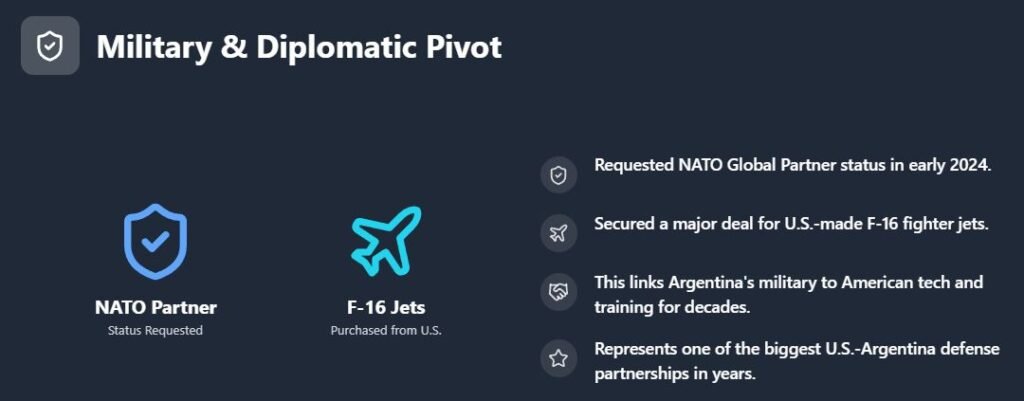
This huge change was caused by pure economic desperation. Previous policies had failed for years, and the country faced inflation over 200% when Milei took office. The economy was so bad that voters, tired of the constant problems, were ready for drastic solutions.
Milei bet everything on American-style capitalism and libertarian economics to save his nation. His pro-American foreign policy serves as a core component of his economic strategy, designed to secure favorable terms and crucial support from the US-influenced International Monetary Fund.

A 2025 Pew Research Center poll revealed the political nature of this shift. Nearly 70% of Milei’s La Libertad Avanza party supporters hold positive views of the United States, while only 37% of non-supporters share this sentiment.
If we consider the entire population, 52% of all Argentinians hold positive views of the US, and just 30% have negative views. American expats are seen as representatives of the economic model Argentina desperately wants to copy. Business opportunities have expanded as the government actively seeks American investment and expertise.
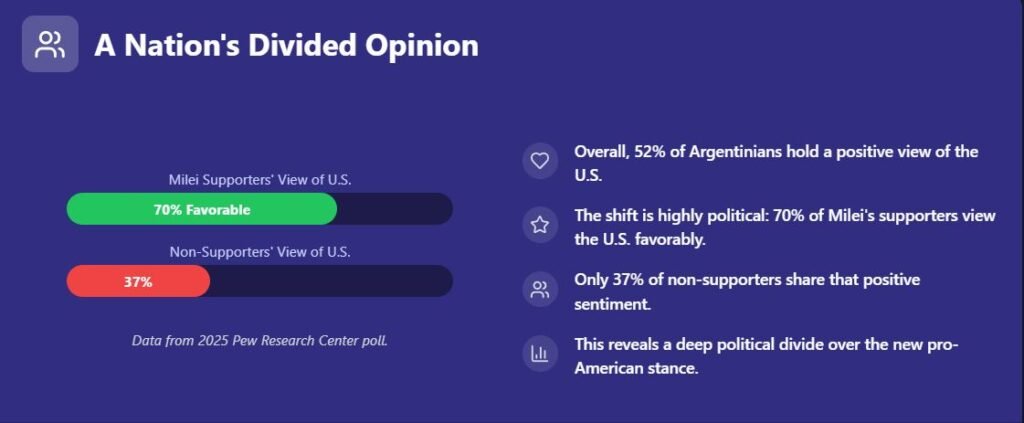
Also, Argentina offers a great quality of life for incredibly low prices – you can live there on less than US$1000 a month!
But remember: this type of politically driven pro-Americanism can change as quickly as it appeared. The durability of Milei’s pro-American policies depends entirely on whether his economic reforms succeed.
Another disclaimer is that why many Argentinians have pro-American views, they are still quite hostile to the UK and Brits in general due to the war between them in the 80s. So, do not make a posh accent when talking English, or you might be confused.
The next country in this list is the place where I was born…. But before reveal it, I have some really good news. FREE FOR A LIMITED TIME: Grab your Expat Wealth & Lifestyle Compass ($108 value) today! Includes our 74-page guide of Affordable European Cities, our Zero-Tax countries report, and our expat checklist. https://bit.ly/ExpatWealthLifestyleCompass Join us here before this offer ends.
Brazil
Brazil’s relationship with the United States is shaped by cultural magnetism mixed with politics and generational differences. Brazil, a nation of 220 million people, has maintained friendly ties with the United States for over 200 years, creating one of the most stable relationships in the Americas.
America was one of the first nations to recognize Brazil’s independence in 1822. World War II cemented this bond through actual combat. Brazil sent the Brazilian Expeditionary Force to fight alongside American troops in the Italian campaign. Brazilian soldiers died next to American soldiers.
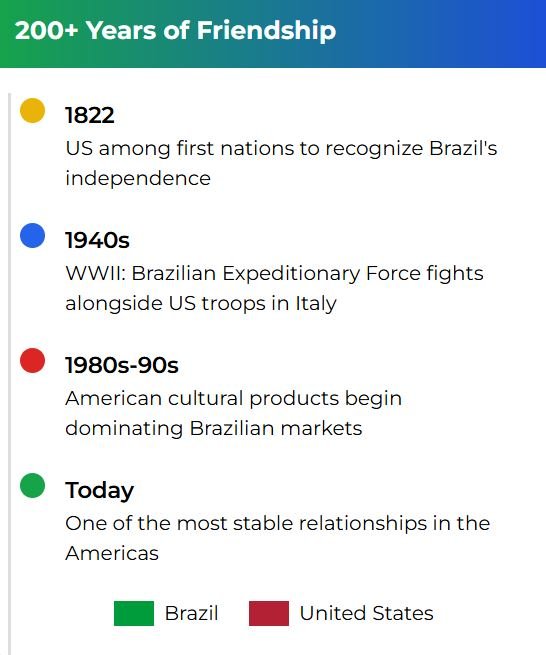
In Brazil, the pro-American feeling comes primarily from culture, not security needs like in the case of Eastern European countries. American films, music, and consumer brands dominate Brazilian markets. Netflix has massive subscriber numbers in Brazil. McDonald’s operates hundreds of locations across the country.
This cultural influence runs deep in major cities like Rio de Janeiro and São Paulo, where American brands and cultural products are everywhere. Brazilians often see America as a land of freedom, opportunity, and modernity. This image resonates strongly with Brazil’s large middle class and young people.
And here we go for our second point: generational differences. A 2025 Pew Research poll revealed that only 37% of Brazilians aged 50 and older view America favorably. But 73% of those under 35 hold positive opinions about the United States.
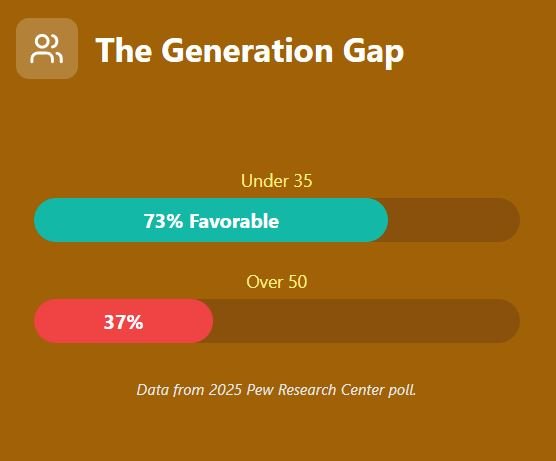
Older Brazilians were taught in schools sociological views based on the ideas of Paulo Freire (which, ironically, despite his anti-Americanism, was a Harvard scholar). Younger Brazilians, meanwhile, grew up consuming American digital media and entertainment, creating a natural cultural affinity.
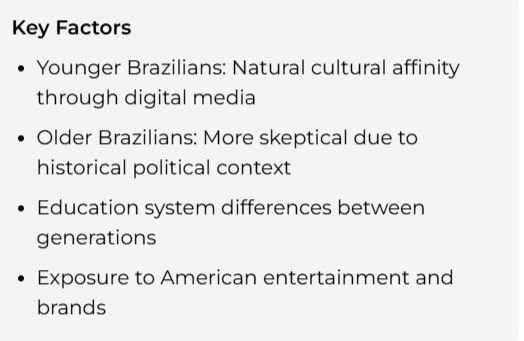
While I left Brazil many years ago, I still have contact with most of my friends, and the majority of them have pro-American views. (Although most of them despise the fact Americans use the word Football for a sport played with hands)
In Brazil, people’s political views often shape how they see the United States. Supporters of Jair Bolsonaro, particularly in the south, generally see the US as a symbol of freedom and a strong ally. In contrast, supporters of Lula da Silva, often concentrated in the northern regions, tend to have more mixed feelings, worrying about American foreign policy and economic power.
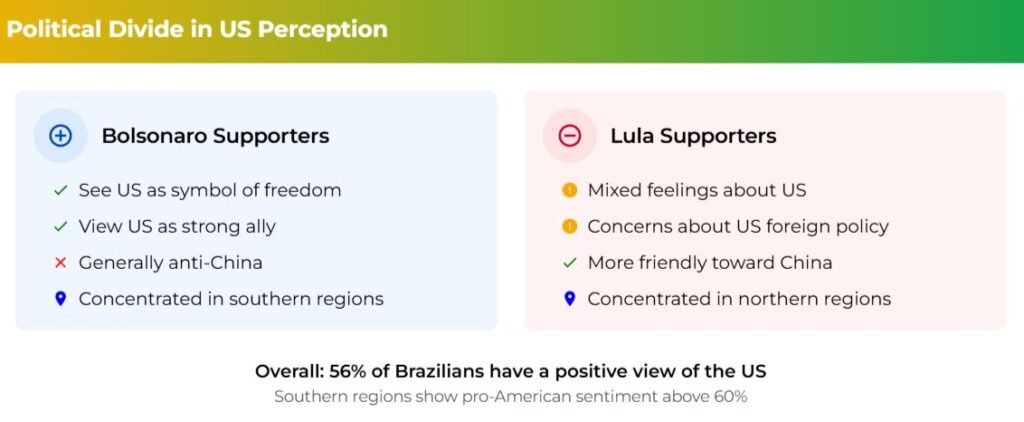
So Brazil is quite pro-American in general: 56% of all Brazilians have a positive view of the US, and just 35% have a negative opinion.

But if we separate by regions, I would say that in Southern regions the Pro-American sentiment is well above 60%.
The good part is that the best places to live in Brazil, if one day you want to move there, are in the South, like the city of Florianopolis which I covered in this article.
A curiosity: the same duality you see with the US, it is also visible with China – pro-Bolsonaro people tend to be anti-China, while Lula supporters are more friendly towards the Chinese.
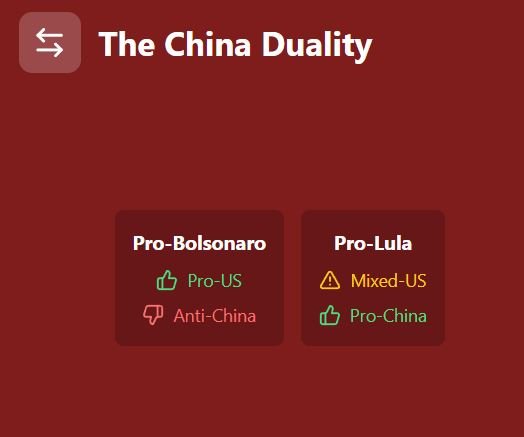
South Korea: The Blood Alliance That Never Faded
Over 36,000 American service members died between 1950 and 1953 fighting alongside South Korean forces against North Korean aggression. This sacrifice became deeply ingrained in South Korea’s national memory.

I visited Seoul a few years back and I saw how they remember the US help. There is a statue of Harry S. Truman in Seoul, specifically built to honour him for his decision to dispatch US forces during the Korean War. There’s also a monument for Marines Crossing the Han River that commemorates achievements by the US-ROK joint marine unit.
The 1953 Mutual Defense Treaty led to America stationing 28,500 troops at bases like Camp Humphreys to serve as a “tripwire” – any attack on South Korea would automatically trigger American military response. These forces conducted annual joint exercises and developed missile defense systems together.
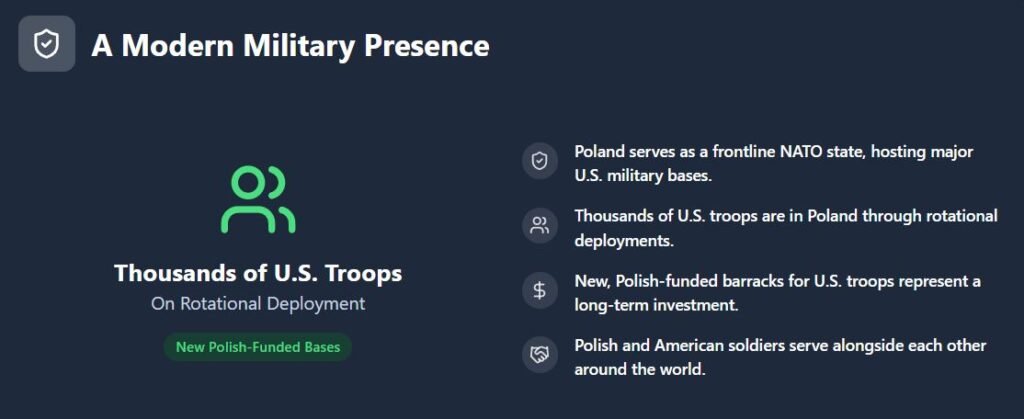
Now, the two countries are tech partners. Samsung and Apple work together to develop and make computer chips. Korean pop culture has also become huge in America, with groups like BTS and Blackpink earning massive commercial success.
This cultural exchange created what experts call the Korean Wave, or Hallyu. South Korean entertainment products generate billions in revenue across American markets. Meanwhile, American streaming platforms like Netflix invest heavily in Korean content production.
The security element is still there – North Korea’s nuclear threats keep the military partnership strong. In 2023, the alliance was formally upgraded to be “nuclear-based,” giving Seoul greater voice in nuclear planning and resuming port calls by American nuclear-armed submarines.

South Korean companies supply critical components for American technology products, while American firms provide advanced manufacturing equipment to Korean factories.
A 2025 Pew Research Center poll found that 61% of South Koreans hold favorable views of the United States.

Even more impressive, 74% support the long-term stationing of American troops in their country. This level of support for foreign military presence is rare anywhere in the world.
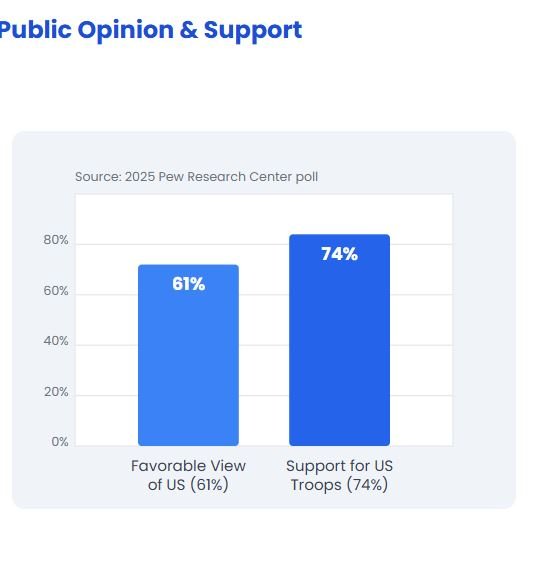
For American expats in South Korea, English teaching positions remain popular, American businesses find welcoming environments, and cultural familiarity makes daily life easier.
The next nation on our list is the place where I currently live in. And by the way, if you enjoy our videos with data-based useful information and the opinions from locals, please remember to click on the like and subscribe button – it is really important for us.
Poland
Poland spends over 4% of its GDP on defense – the highest of any NATO country, with plans to reach 5% by 2026.
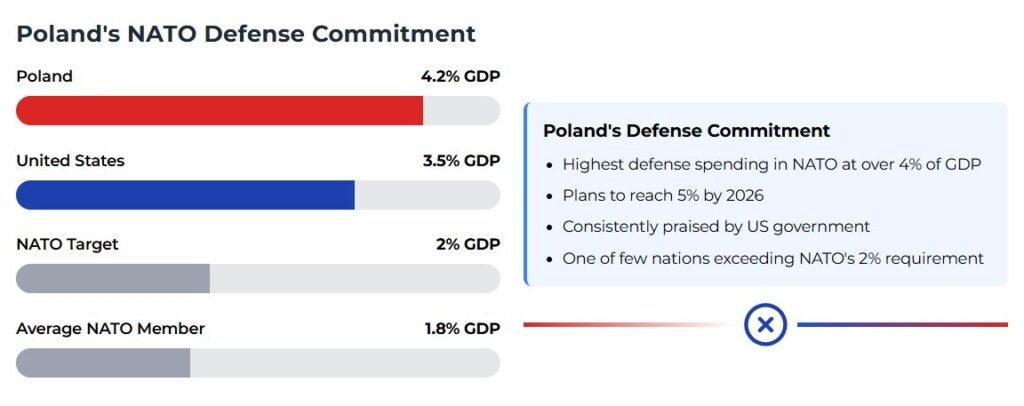
The US government constantly praises the Poles as one of the few nations that fulfills its spending commitment in the NATO alliance. But this isn’t just about money – it’s about a relationship built on over 100 years of American support at crucial moments.
The story starts after World War I, when America, unlike other hesitant European powers, was among the first to recognize Poland’s independence in 1919.
Then came the 1980s, when America supported the Solidarity movement that helped bring down communism. The US provided approximately $20 million in covert support to Solidarity between 1983 and 1991. This assistance included funding, equipment for printing underground newspapers, broadcasting equipment, and organizational help. All of this was funneled through third parties to maintain secrecy, but Poles knew where the support came from.
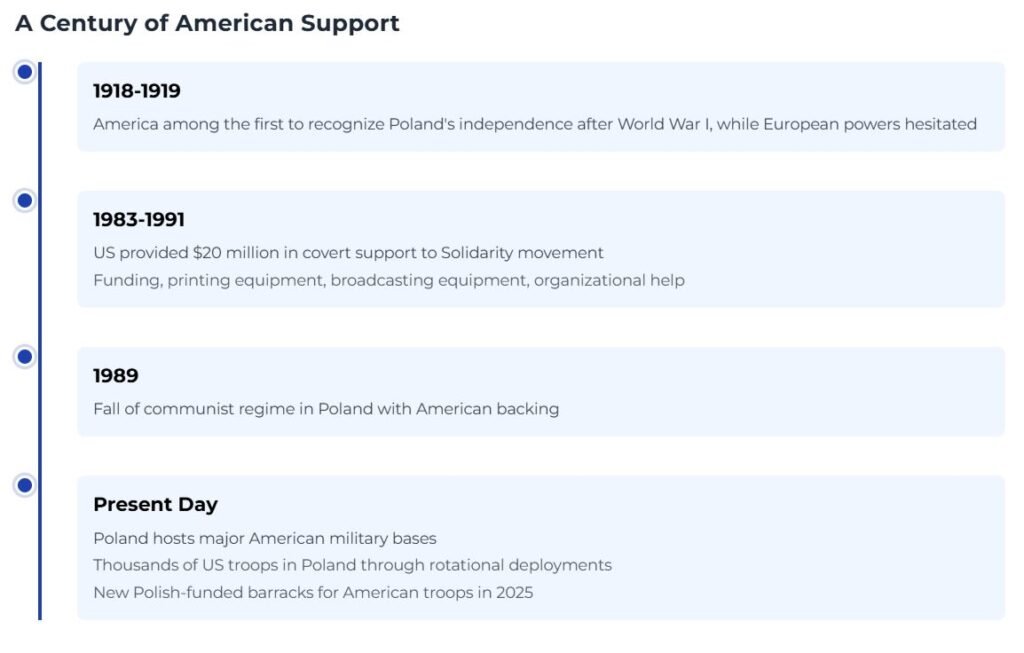
This backed played a crucial role in the movement’s survival and the eventual fall of the communist regime in 1989.
Today, with Russia next door making threats, Poland sees America as its ultimate security guarantor. The war in Ukraine reinforced this feeling, as Poland became a frontline NATO state facing potential Russian aggression.
I live in Poland currently, and every year there is a huge military parade here – the biggest one in the European Union. And Polish soldiers parade together with American soldiers, while American F35 fighter jets cross the skies and people cheer.
What makes Poland special is that the pro-American feeling exists across all political parties and social classes. A Gallup poll found that Poles hold some of the most favorable views of the United States in Europe.
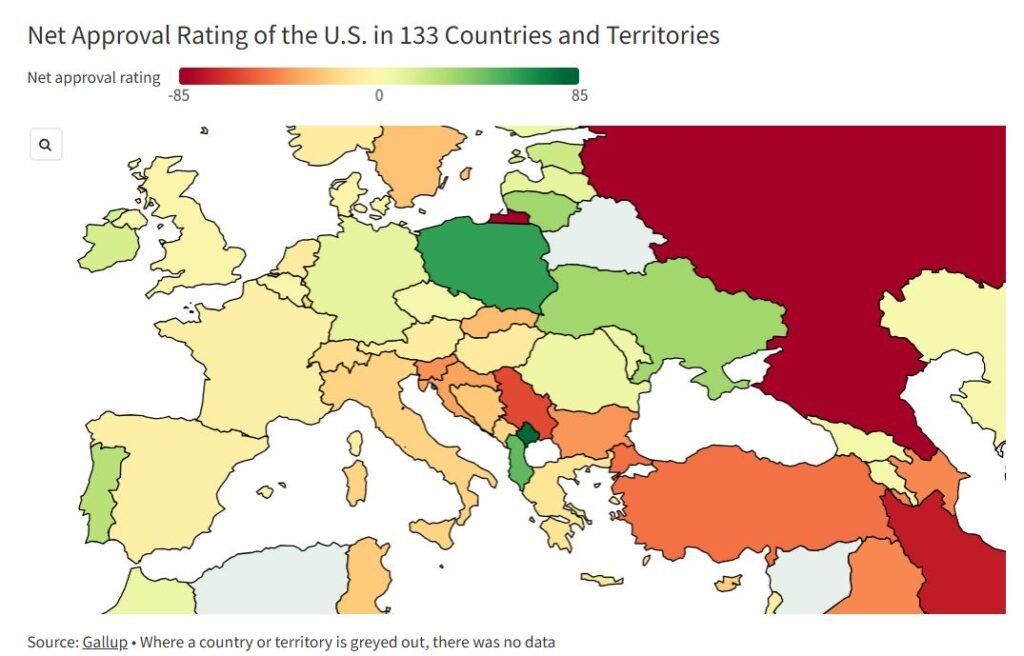
Polish cities now host major American military bases, and Polish soldiers serve alongside Americans worldwide. The US keeps thousands of troops in Poland. They rotate in and out, and in 2025, they will move into new training areas. This represents a long-term commitment from both sides.
In Warsaw, you’ll find both a statue honoring Ronald Reagan and one of the most important roundabouts in the capital, called Ronald Reagan Roundabout. These monuments reflect genuine appreciation for American leadership during the Cold War.
For American expats, this translates into a welcoming environment. English is widely spoken in major cities, and Polish hospitality often extends naturally to Americans.
However, be aware that Warsaw is quite expensive – more than Berlin. There are, however, some places in Poland where you can live in a palace (literally) for the rent you would pay for an apartment in the US.
Albania

Albania has streets named after American presidents in almost every major city. The town of Hamza actually has a Donald Trump Boulevard. This small Balkan nation of just 2.8 million people has one of the most pro-American populations on Earth, and the reason goes back to a moment when America stepped in to save lives.
The story traces back to 1999, when NATO bombs fell not on Albania, but on their neighbors in Yugoslavia. America led the 78-day air campaign that halted the war against the Albanian population in Kosovo.
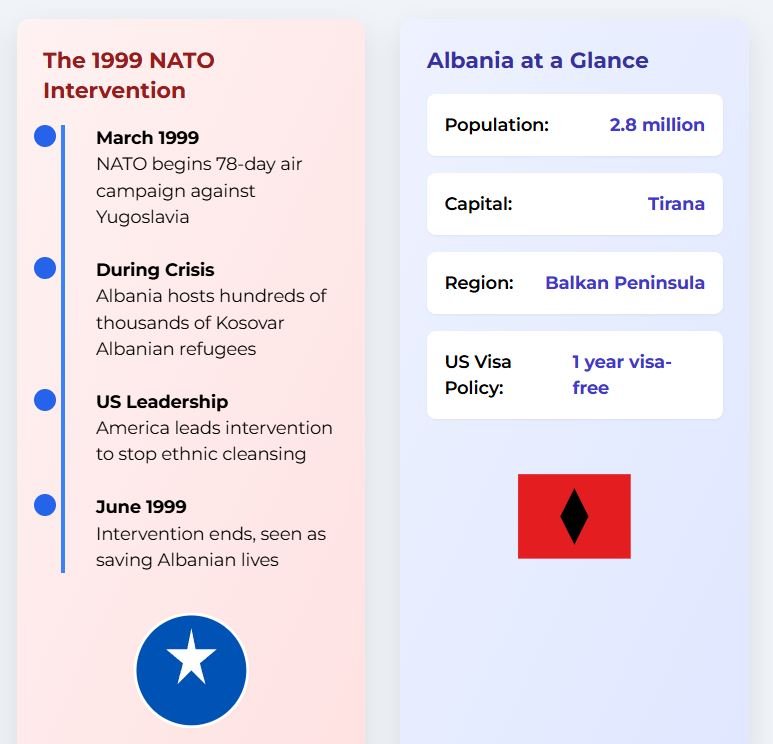
They appreciated more than just the military help. They saw America as a country that defends small nations from bigger ones. During the crisis, Albania took in hundreds of thousands of refugees from Kosovo and was a key base for aid work. This direct involvement made the American intervention personal for Albanian families.
Today, you’ll find American flags displayed in Albanian homes, businesses, and government buildings as a genuine expression of popular sentiment. The capital Tirana has a statue of Bill Clinton standing prominently, and there’s even a town called Bushkash named after George W. Bush.
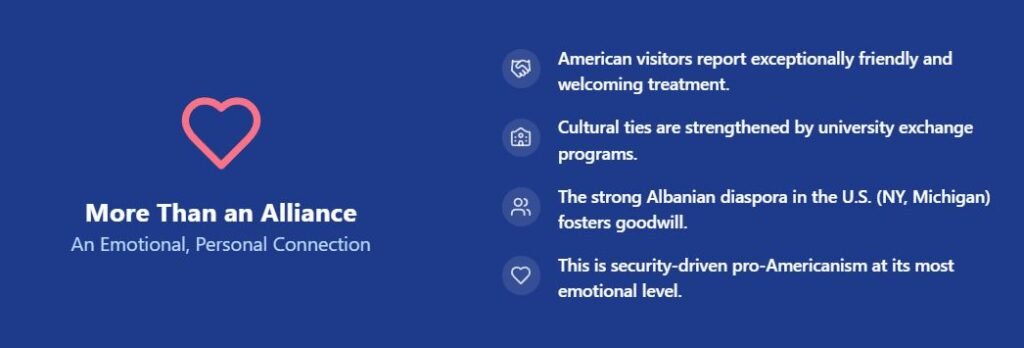
American visitors to Albania report very friendly treatment from locals. English is widely spoken among the younger generation, and Albanian TV and music often feature Western influences, including American content. Tirana’s University has many American professors and exchange programs that strengthen cultural ties between the countries.
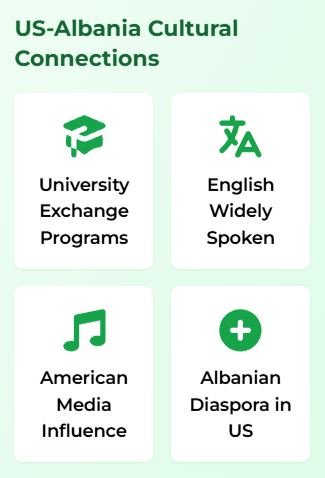
On the street, locals are curious about US travelers and eager to practice English. The strong Albanian diaspora in the United States, especially in Michigan and New York, also fosters goodwill. Many Albanian-Americans support projects in their homeland, creating ongoing connections between the two countries.
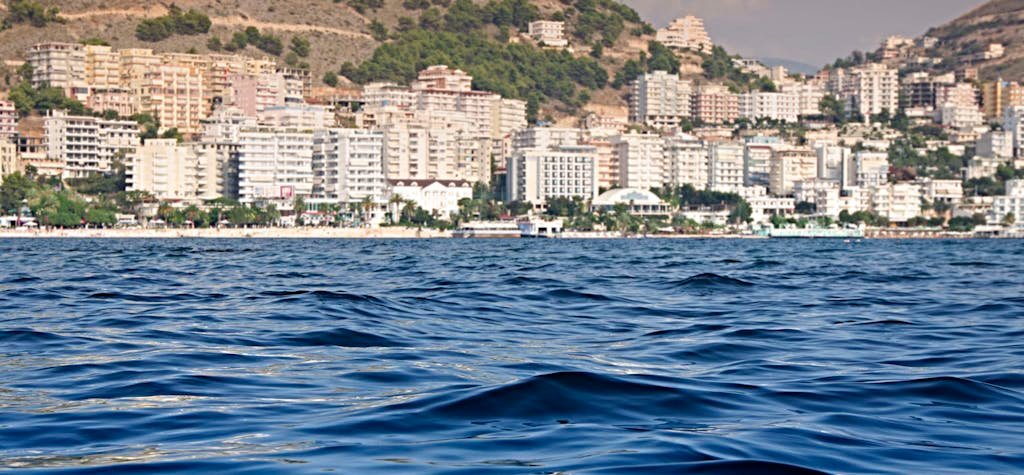
For American expats, Albania offers Mediterranean weather, low costs, and a population that genuinely celebrates your nationality. You can live comfortably on a modest budget while enjoying coastal access and mountain scenery. The country provides visa-free access for Americans staying up to one year for tourism purposes.
The Philippines
The Philippines has a complex and unique relationship with America. It’s the only place where American colonial history actually created long-term positive feelings toward the United States.
The story is complex: America took control of the Philippines in 1898, but did something unusual. Instead of just extracting resources like typical colonial powers, America built schools, hospitals, and infrastructure throughout the islands. The U.S. colonial period from 1898 to 1946 introduced English as an official language and established a widespread public education system.
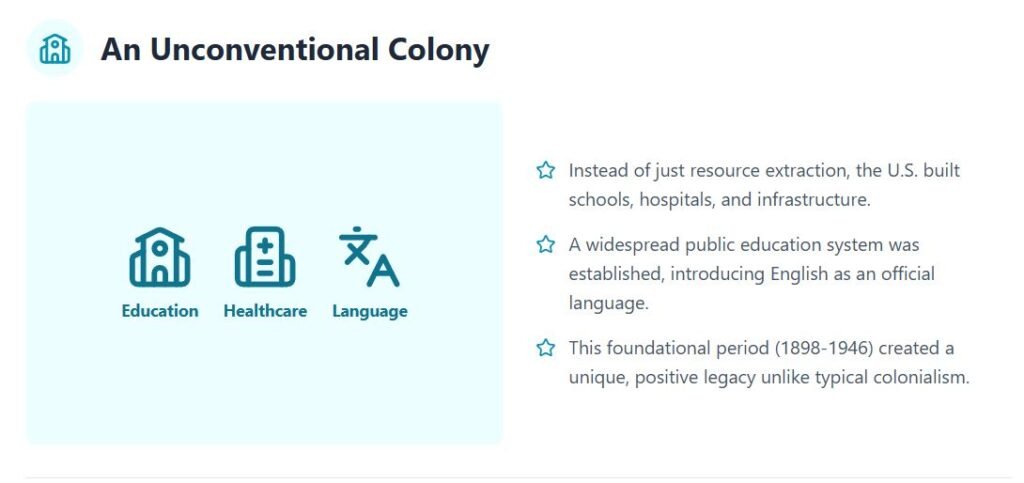
Then came World War II, when Americans and Filipinos fought side by side against Japanese occupation. U.S. and Filipino soldiers fought together in desperate defense at Bataan and Corregidor. This shared sacrifice against a common enemy forged deep military camaraderie that continues today. General MacArthur’s famous “I shall return” promise became a symbol of American commitment to Filipino freedom. The U.S. fulfilled its promise of independence after the war, granting it on July 4, 1946.
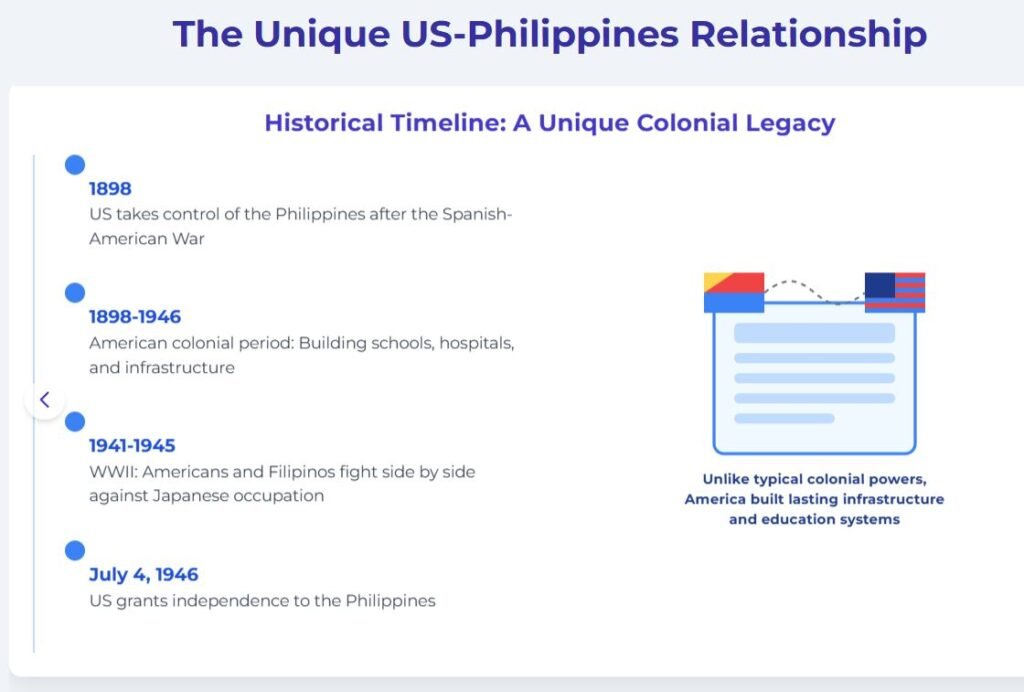
Today, this history combines with a modern strategic partnership against Chinese expansion in the South China Sea. A 2014 defense deal, called the EDCA, lets more U.S. troops rotate through specific military bases in the Philippines. The number of sites has expanded, granting U.S. forces strategic access to locations facing the South China Sea and the Luzon Strait. In 2025, the U.S. is actively funding modernization of these sites, including construction of facilities at Naval Detachment Oyster Bay in Palawan.
Filipinos consistently rank among the most pro-American populations in global polls, and 80% of all them have positive views of the United States. Even during Rodrigo Duterte’s presidency, when he adopted an anti-U.S. stance, a 2017 Pew poll still found a 78% favorability rating.
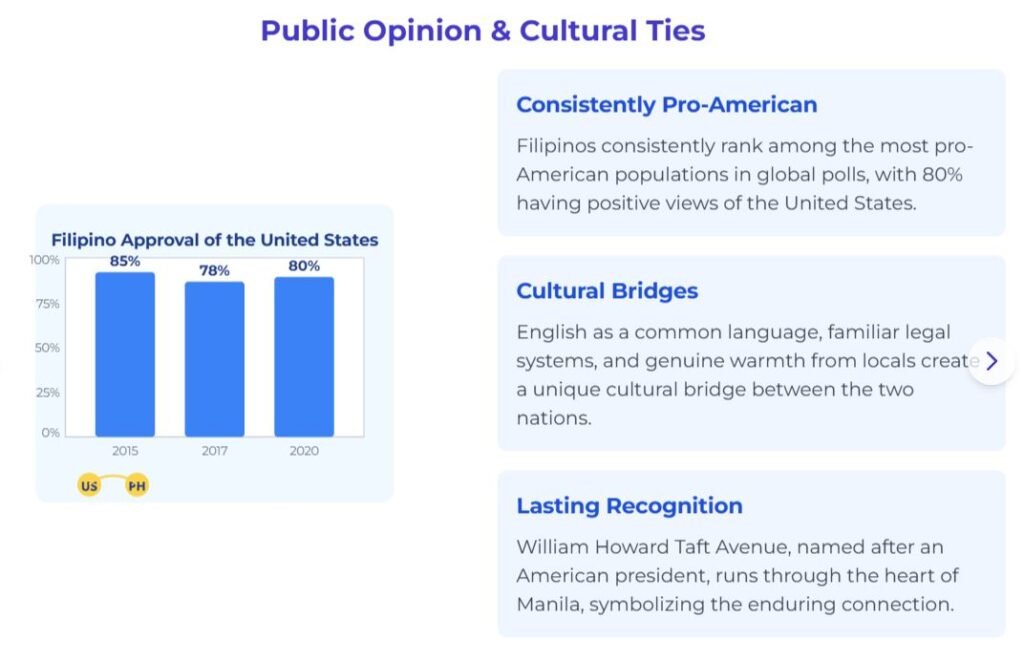
There are around 11,000 American troops contributing to Philippine security through rotational deployments and joint exercises. One of the main avenues of the capital, Manila, honors an American president: William Howard Taft Avenue runs through the heart of the city.
For American expats and retirees, the widespread compulsive of English, a lower cost of living, and cultural familiarity make for a welcoming environment and easier integration.
Kosovo: The Newest Nation’s Deepest Gratitude
Kosovo has more statues of American leaders per capita than America itself, a testament to its unique relationship with the U.S. This tiny nation of just 1.9 million people exists today because of American military intervention in 1999.
The 78-day bombing campaign, led by America, stopped the violence by Serbian forces. This action prevented a much larger crisis. At the time, nearly 1.5 million Kosovo Albanians had been forced to leave their homes.
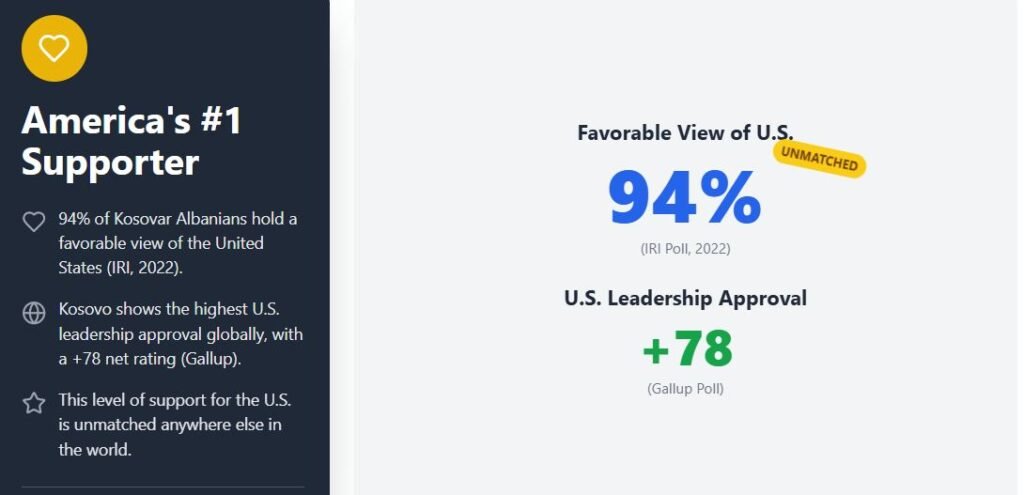
The gratitude is deeply personal, as nearly every Kosovo Albanian family has a story of how the American intervention saved their lives or community.
I asked a local about their positive opinion on Americans, and this is what he told us:
“Yeah it’s true. There’s no other country in Europe that loves America more then Kosovo or Albania. I unironically see more USA flags 🇺🇸 here in Kosovo then when I went to Visit the US – and guys, if you come to visit one day: Make sure to tell people that you’re an American. People will be even more friendly.”
Some families in Kosovo have American flags in their living rooms and portraits of American presidents hanging on their walls. You’ll find these displays in private homes throughout the country, something rarely seen anywhere else in the world.

Today, you’ll find the Bill Clinton statue in Pristina, streets named George W. Bush, and American flags everywhere. Kosovo named a major boulevard Bill Clinton Boulevard and erected a golden statue in his honor. The capital city features a square named after former Secretary of State Madeleine Albright.
Kosovo shows the highest U.S. leadership approval globally, with a +78 net approval rating, making it America’s strongest supporter according to recent Gallup data. A 2022 survey by the International Republican Institute found that 94% of Kosovar Albanians had favorable views of the United States. This level of support is unmatched anywhere in the world.

America was among the first countries to formally recognize Kosovo as a sovereign state on February 18, 2008. The United States remains the principal external partner in Kosovo’s state-building projects, helping establish democratic institutions and promote economic development.
The U.S. is the main supporter of a plan to turn the Kosovo Security Force into a modern army that can work with NATO. To show its commitment, Kosovo has sent its own troops to join American missions in Afghanistan and Iraq.
So… Turns out, some countries actually like Americans. Who knew? Certainly not YouTube.
Now, if you are asking yourself if Americans are welcome in other European countries, like Italy, France, or Portugal, the situation is really not as bad as the media portrays. In fact, many Europeans appreciate the diverse perspectives and cultural exchanges that come with American visitors. This openness is especially evident for those interested in starting a business in Europe, as entrepreneurial initiatives are often encouraged and supported by local communities. As a result, Americans may find that they are not only welcomed but also embraced in their endeavors across the continent.
I wrote an article breaking this myth that Americans are not welcome in Europe.
Levi Borba is the founder of expatriateconsultancy.com, creator of the channel The Expat, and best-selling author. You can find him on X here. Some of the links above might be affiliated links, meaning the author earns a small commission if you make a purchase.




